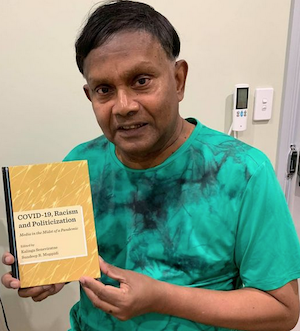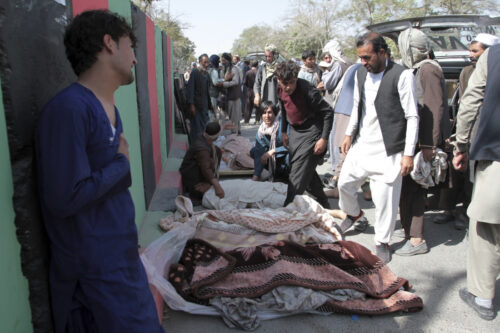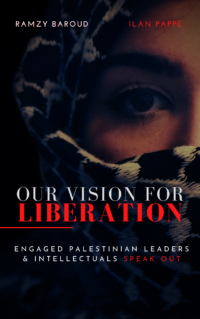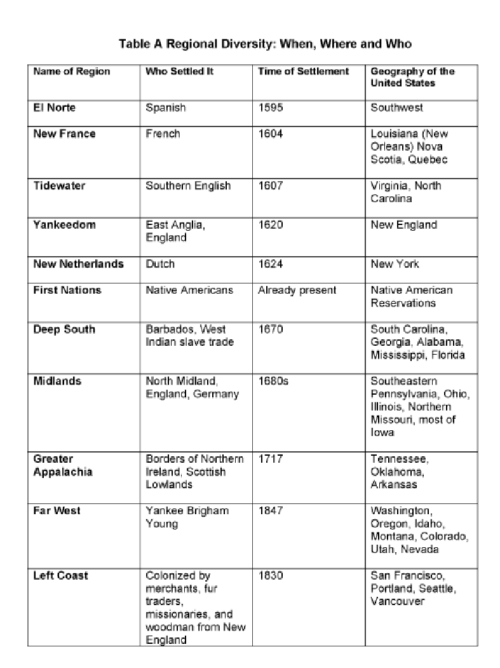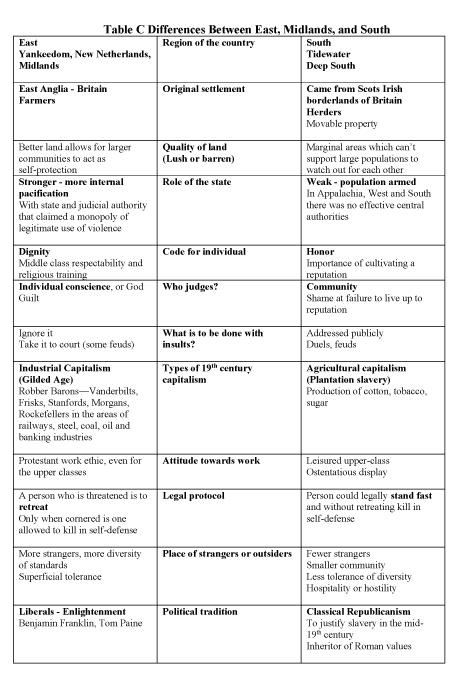
The bible is a book that has been read more and examined less than any book that ever existed.
— Thomas Paine, Letter to Mr. Erskine, Paine’s Complete Works, Vol. 3, p. 179.
Those men, whom Jewish and Christian idolaters have abusively called heathens, had much better and clearer ideas of justice and morality than are to be found in the Old Testament, so far as it is Jewish; or in the New.
— Thomas Paine, Age of Reason, Footnote 28
All that man has accomplished for the benefit of man since the close of the dark ages – has been done in spite of the Old Testament
— Robert Green Ingersoll, About the Holy Bible, (May 19, 2017) Part III. The Ten Commandments
Men never do evil so completely and cheerfully as when they do it for religious conviction.
— Blaise Pascal
Orientation
According to Andrew Seidel, 32% of Americans think it is very important to be Christian to be truly American. But what does it mean to be an “American”? Well, if being an American has anything to do with the Constitution or the Declaration of Independence, many Americans are in serious trouble. For example, Seidel writes:
On the first 4th of July of Trump’s presidency, National Public Radio tweeted the Declaration and Trump supporters lost their minds. They were sure NPR was calling for a rebellion against Trump. (80)
But the problem is even deeper because Americans really don’t know the bible very well either:
The bible has been edited rewritten, supplemented, translated, retranslated and mistranslated so many times that claims of immutability are laughable. Yet about 30 percent of Americans, many of them Christian nationalists, believe in the bible literally …word of their god. (115)
In fact, according to Seidel:
research shows that atheists know the Bible better than Christians. (115)
In 1951, 53% of Americans could not name even one of the gospel. In 2010, 49% couldn’t.
Claim
 My article is a review of a very powerful book written by Andrew Seidel called The Founding Myth: Why Christian Nationalism Is Un-American. As Seidel says, the purpose of the book is to utterly destroy the myth that the founders of the Constitution were committed to founding a Judeo-Christian nation. The contrast between the Bible on the one hand and the Declaration of Independence and the Constitution on the other is so great that, as Seidel says, one is almost forced to choose: are you a Christian or an American?
My article is a review of a very powerful book written by Andrew Seidel called The Founding Myth: Why Christian Nationalism Is Un-American. As Seidel says, the purpose of the book is to utterly destroy the myth that the founders of the Constitution were committed to founding a Judeo-Christian nation. The contrast between the Bible on the one hand and the Declaration of Independence and the Constitution on the other is so great that, as Seidel says, one is almost forced to choose: are you a Christian or an American?
Part of the book is dedicated to exposing the notion that the founders themselves had any sympathy for Christianity. Secondly, it is to show how both the Declaration of Independence and the Constitution directly contradict both the Old and the New Testaments. Thirdly, within the Bible the Ten Commandments are shown to be anti-Constitutional. Lastly, the book shows how it was only through a propaganda campaign during times of national fear such as The Civil War and the anti-communist scare that right-wing preachers smuggled in Christian propaganda onto coins and paper money (In God We trust); and into the Pledge of Allegiance (One nation Under God).
Qualifications
This book does not argue that religion should be absent from our culture. It only says that religion should be absent from our constitutional identity. In fact, research shows that in societies that have a separation of church and state, people are more religious than when there is no separation. Seidel argues that when there is no separation, people take religion for granted.
Secondly, there is no simple relationship between separation of church and state and whether someone is religious or not. Someone can be religious and endorse the separation of church and state. Thirdly, while some founders were deists and others were theists, even though some were theists does not prove they used their religion to found the nation. People can make a distinction between their private and public political commitments. Fourthly, founders who were Christian were only supportive of the teachings of Jesus. There was no implication of support for any Catholic or Protestant institutions or teaching.
Qualifications about my being an American and supporting the Constitution.
It would be natural to think that in attacking Christian nationalism as being un-American, I identify with being an American. I don’t. My purpose in using the term “un-American” is to offer an immanent criticism of Christian nationalism. Immanent criticism means criticism from within the principles of my adversary. What I am saying is you don’t even live up to your own principles of being an American by failing to abide by the Constitution or the Declaration of Independence. An externalist criticism would be to criticize Christian nationalism from a Buddhist, Muslim or socialist perspective.
Also, in defending the Constitution and the Declaration of Independence against the Bible, it doesn’t mean I am uncritical of the of either of these American documents. As a result of reading Seidel’s book, I do have a newfound respect for the importance of separating Church from the State. There are clear limits set on religion’s invasion of science or politics. While secular laws could be much tighter, the justification for insisting on the separation is very well thought-out and it is still very important over 200 years later.
Were the Founders Christian?
Seidel uses many sources to show that the painting of Washington praying in the snow was a piece of artistic Christian propaganda. Washington was not a good Christian. He attended religious services irregularly, he didn’t kneel during prayer and often skipped out of Church early. He refused to have a priest at his deathbed. Jefferson took a more militant stand against Christianity. He attempted to rewrite the Bible cutting out the references to supernaturalism, miracles and slaughter in the hopes of salvaging something. Jefferson said later that his efforts were like “pick out diamonds from a dunghill.” Jefferson and Madison were very critical and suspicious of organized religion and the “priestcraft” that accompany them. Some founders treated the Trinity with contempt, calling it Abracadabra.
When the founders mention “The Creator” the Christian nationalists break out in celebration, declaring victory. Hold your horses and bugles! Nowhere is Jesus or Yahweh specifically mentioned. Virtually all cultures have a creator god who are more or less involved in his creation. The same is true with the Golden Rule. Christian nationalists act is if this rule was unique to Christianity. Most cultures in the world have their own version of the Golden Rule often dating to thousands of years before Christianity. Furthermore, when god was named it was “nature’s” god. Seidel rightly points this is more likely to resemble the god of the wind or the trees than the description of a biblical god. Nature’s god is a pagan god, not the Judeo-Christian monotheistic god.
The founders engaged in what Seidel calls “strategic piety”:
Writers were wise to choose language that would take advantage of the majority religiosity but still remain wholly nonsectarian. It was designed to be acceptable to deists and orthodox alike. (88)
In psychological terms the founders were playing to people’s confirmation bias- our innate selection and interaction of evidence to support our existing beliefs. (90)
Do You Need God to be Good?
For themselves, the founders thought their morality was sufficient to guide them and religion was unnecessary. However, some of the founder thought religion was necessary to keep the masses moral. For many founders, religion was not the source of morality, but a substitute for it. Without religion, the masses could not be moral. But the founders were not fussy about which religion filled the bill. Washington and Adams suggested that any religion, not only Christianity, can replace morality.
So the Founding Fathers were elitists. But were they were right about the capacity of large populations to prosper and live morally without religion?
Do Secularists Produce Worse Societies than the Religious?
The short answer is – no. Seidel points out:
Social science now unequivocally shows that the less religious a society, is the better off it is. We now know that religion is not necessary for society to succeed. (49)
Within America the states with the highest murder rates tend to be highly religious – Louisiana and Alabama. States with the lowest rates are the least religious the country, like Vermont and Oregon.
Of the top 50 safest cities in the world, nearly all are in relatively non-religious countries. During the Holocaust, the more secular the people were, the more likely they were to rescue and help persecuted Jews.
The least religious countries:
Have lowest rates of violent crime and homicide
Are the best places to raise children
Have lowest levels of intolerance vs race
Have the highest in women’s rights
Are the most prosperous
Within the US, those states that are the most religious have societal ills:
Highest rates of poverty
Highest rates of obesity
Highest rates of infant mortality
Highest rates of teen pregnancy
Lowest level of educated adults
Highest rates of murder and violent crime (49-50)
There were Christian Colonies but no Christian Nation
Christian nationalists are right to point out that during the colonial period most of the colonies were religious, whether they were Puritans, Catholics, Anglicans, Lutherans, or Quakers. However, when the founders wrote the Constitution, they kept these religious beliefs outside the politics of founding a nation. The religions of the colonists did not help them to overthrow the British. Every colony was part of the British Empire, which was subjected to a Christian king. Colonial history also precedes the separation of Church and state which was part of the Constitution. The colonies were a British outpost, subject to a divine king. This is exactly the political theology the founders were fighting against. Table A is a contrast between the structure of life during colonial history vs after the declaration of independence. Please take a look at Table A.
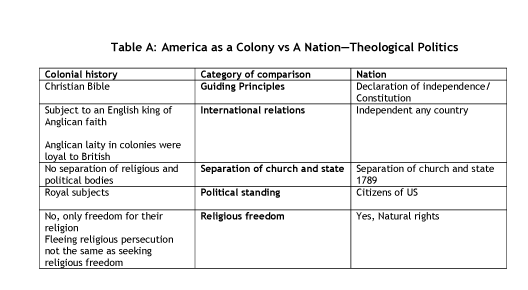 The Bible as a Piece of Literature
The Bible as a Piece of Literature
The Bible is unlike other literature. Seidel points out that unlike like Shakespeare’s plays and poetry, Aesop’s fables and the legends of Greek and Roman mythology, which stood on their own merits, the Bible’s reputation was imposed and propagated over thousands of years with fire and brimstone. It was then reinforced regularly through weekly ceremonies. It is an authoritarian document which doesn’t have rhetorical appeal based on reason. Instead, the Bible is a document people must live by and bow down to, no matter what.
The un-American, Authoritarian Nature of the bible
Exclusivity and obedience
Right out of the gate the bible is exclusionary, rather than inclusive. Yahweh picks the Jews as his “chosen” people, whereas in the Constitution, at least theoretically, all are welcome. Whereas in one of Paul’s letters Christians are told to obey the authorities, in fact, they are servants of God. For example, Abraham is commanded by God to murder his son Isaac as an offering. God turned Lot’s wife into a pillar of salt for looking back to see the destruction. God demands the killing of first-born children unless there is lamb’s blood on the family door frame. This contrasts with the Declaration’s note to rebel against the authorities when they are tyrannical. Why? Because “we the people” rule.
Monarchies and divine dictatorships
In the Bible God does not rule by consent of the governed. Neither is there a separation of powers for governing, God rules by decree. God loves monarchies. Seidel points out that the first two books of the bible are titled “Kings”. Many of the heroes in the bible are kings, specifically, Saul, David and Solomon. Whatever rights people have been given by God. Likewise, God can take away those rights. Following the Enlightenment people have human rights which no political or religious authority can take away. In terms of following rules, the Judeo-Christian God of Christian propaganda says that God lays down the laws once and for all. In fact, with different versions of the Bible the laws change. Under the American Constitution laws can be changed by amendments. Objectively, the origin of the laws was from an Early Iron Ages society 1200 BCE years ago. The Constitution is close to 250 years old, while drawing from Greek and pre-Christian Roman law.
Faith and reason: how do we know?
If faith is defined as believing in something in spite of evidence, the Founding Fathers had no room for faith and that is how they came to understand the Constitution. They went through an evolving process of dialectical reasoning internally and debating, compromising and tinkering over months. Most of the founders tinkered with inventions, kept up with the sciences and saw politics, itself, as a science.
For those who followed the Bible, the Bible was given to them completed. God did not encourage any input from humanity. You simply had faith. You believed in the Bible in spite of evidence. Belief in miracles is just one instance. So too, when it comes to Christian nationalists in politics, there is no room for compromise or tinkering. Since they believe they are acting in the name of God, compromising with non-believers is not being true to God. On the whole, Seidel says:
what a Christian government looks like: exclusive, exclusionary, divisive, hateful, severe and lethal. (106)
Crime and punishment
When it comes to punishment the Bible paints with broad brush strokes. The punishments are inflexible and extremely violent. God destroys Canaan as well destroying all those believing in other gods. Disobedient children are stoned; so are wizards and women having premarital sex. Heretics and witches are tortured and followers are told that disobedience will be dealt with fire for eternity. The Constitution, on the other hand, simply strives to make punishment be proportionate to the crime, and punishments are limited to this lifetime.
Guilt and innocence are handled in opposite ways. In the Bible, whole groups are condemned as guilty and the guilt is inherited across generations. In the Constitution, there is no collective guilt. Individuals are found guilty and that guilt is not inherited by their sons and daughters. Finally, in the Bible it is not very important that innocents suffer and are killed, provided the guilty party does not get away with anything. In the Constitution the situation is the reverse. It is better that the guilty get away than for the innocent to be punished unjustifiably.
Origin and destiny
For the Bible, life on earth is a reform school. Why do people need to be reformed? Because in the mythological Garden of Eden, Eve ate the fruit the devil offered her even though God forbade it. Humanity was condemned from that time forward. While self-improvement is possible, ultimate redemption can only come from the sacrifice of Christ for humanity. In terms of future generations of humans, that is not the concern of Christian nationalists. The idea is you earn a ticket to the Promised Land and the Devil take the hindmost.
I’m afraid that the Constitution is far less dramatic. Individuals, according to Locke, are blank slates. Locke said parental socialization does matter, but in the end, it is the individual’s responsibility for what they make of themselves. There is no need for redemption either in this life or the next. However, the Constitution, unlike the Bible, was written for future generations of humanity on Earth. Please see Table B for a summary.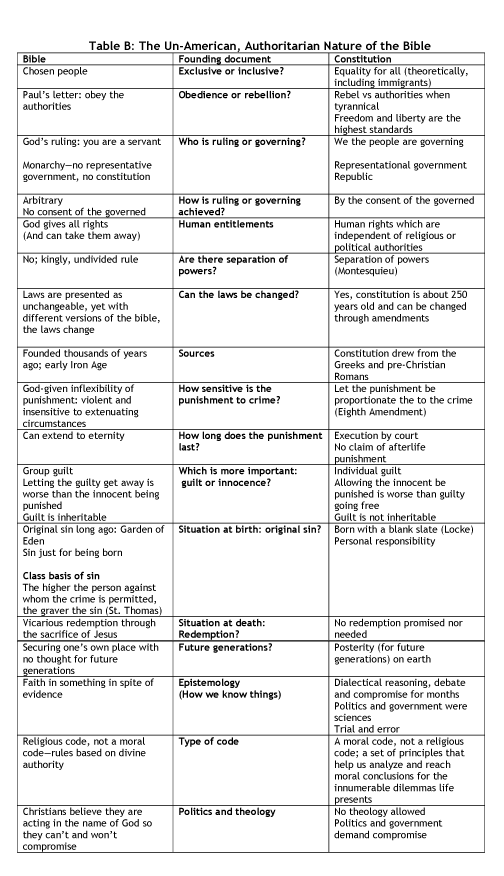 The Authoritarian Nature of the Ten Commandments
The Authoritarian Nature of the Ten Commandments
Strange gods and idolatrous images
The Ten Commandments is only a small part of the Bible, but they allow us to contrast in a very concentrated form extreme differences between this sacred document and the Constitution. The first commandment is a direct attack on religious freedom. “I am the Lord thy God, thou shalt have no other gods before Me.” The Constitution guarantees the freedom to worship any God, not just the Judeo-Christian one. The second commandment forbids making images. This iconoclastic mania on the part of the Protestants resulted in the destruction of centuries of magnificent artwork. The Constitution, on the other hand, allows for making pubic images to honor its heroes. Any trip to the Lincoln memorial or a trip to Mount Rushmore will reveal that the non-superstitious use of images is possible and can bring great inspiration.
Blasphemy and coercive church attendance
The third commandment, “Thou shalt not take the name of the Lord thy god in vain”, is really about controlling language. There is a double standard about blasphemy. Jews can blaspheme heathen deities, but it is a capital crime to blaspheme Yahweh. In contrast, the Constitution makes a distinction between words and deeds. It says in effect “sticks and stones may break my bones but names can never hurt me”. The Constitution says criticism of all religion is legal. The fourth commandment to “Keep holy the Lord’s Day” is more sinister than it seems. Seidel says this is not about rest for the weary. It is really about shepherding the population to churches on days when most people are not working. Priests complain about poor attendance at church. What better way to herd people into church then by first saying even the Lord needs to rest, and so do you. But no sooner do people discover they are entitled to a day off than they find themselves in church listening to sermons. While there is nothing in the Constitution which tells people not to work, there is also nothing in the Constitution that forbids workers from taking matters into their own hands. They can legally join unions, and strike in order to have some time off. As the saying goes, it was labor that gave Yankees the weekend.
Honor your parents no matter how authoritarian or abusive they are
The fifth commandment says honor thy father and mother. Sounds pretty good except that the foundation of it is to honor your biological parents, no matter what they do. No matter what the parents do they should be honored. Though this has happened all too late in Yankee history, there are now child-protective services to allow children to get away from abusive and violent parents. Not all parents are worthy of respect. Furthermore, the Bible is talking out of both sides of its mouth when they talk about this because Jesus also makes a big deal about leaving your parents to come follow him.
Clannish, parochial rules towards murder, stealing and lying
Seidel chunks together the sixth, eight and ninth commandments and attacks them for their clannish, exclusive nature. Whether it is killing, stealing or perjury, the Bible only forbids these things when it is done to fellow Jews and Christians. With non-Jews or Christians, all bets are off. You can kill, steal or lie in dealing with people from other religions. In the case of the Constitution, killing, stealing or lying is punishable no matter what religion one is as well including people who have no religion at all.
Patriarchal repression of sexuality
The seventh commandment about committing adultery has an even narrower interpretation than the previous three commandments. In this, even within the Judeo-Christian tradition, the laws of adultery do not apply to married men, but only to married women. Seidel says fathers can sell their daughter into sexual slavery but only to another Israelite. Men can get away with rape, if they pay the victim’s family 50 shekels and then marry the victim.
The Christian Bible tries to halt and repress their flock’s interest in sex by promoting celibacy. We only have to look at the record of the Catholic Church and its priests to reel in disgust over such a monstrous policy. Seidel points out Judeo-Christianity tries to kill the sex instinct, distort it and vilify it to ensure loyalty to the leader, not to one another. This is a common tactic that male cult leaders use with their followers. It builds up spiritual debt. Lusty, guilty sinners are bound more tightly to the person who can expiate their sin, Jesus, and later, priests. In the Constitution there are laws against adultery, but they apply to men as well as women and there are laws that apply to rape and sexual slavery that are punishable.
The tenth commandment is not about actually fooling around with your neighbor’s wife. Rather, it’s about lusting after your neighbor’s wife even if you do nothing. This is where the 10 Commandments crosses the line into Orwell’s thought crime. Evil thoughts are the same thing as evil actions. Being angry is the same as being violent. As Jefferson said, the powers of government apply to action not opinion. You cannot be thrown in jail for having an opinion. Please see Table C for a summary. Smuggling in Christianity via Theological Propaganda
Smuggling in Christianity via Theological Propaganda
In God We Trust on coins during the Civil War
“In God We Trust” was smuggled onto coins in 1863 in the middle of the Civil War and was pushed through between 1861 and 1864.
“Evangelical Christianity” invaded and polarized the political debate in the cases leading up to the Civil War. It turned the democratic process which relies on compromise into a battle over sacrosanct issues of faith.” (262).
“One nation indivisible” became “one nation, under God, indivisible”. As Seidel says this change places religion, one of the most divisive and murderous forces in history, right in the middle of a badly needed unifying sentiment.
To choose something so divisive to replace a unifying sentiment in the middle of a war that actually hindered the nation shows hubris typical of religious privilege. (272)
Christianity promotes slavery
Appeals to the Bible justified revivals in the slave trade and slave prisons. The pulpit and the auctioneers’ block stand in the same neighborhood. (267)
Christian resistance to slavery was nowhere to be found when the colonies instituted slavery in the 1600s. (268)
It was used at a time of national peril and danger when people were too busy dying for the Constitution to protect it from a rear-guard assault, to promote their personal religion. (272)
Bible thumping anti-Communists
In 1954 the Pledge of Allegiance was changed. “I pledge allegiance to the flag of the United States of America, and to the republic for which it stands, one nation, indivisible with liberty and justice for all” became “I pledge allegiance to the flag of the United States of America, and to the republic for which it stands, one nation under God, indivisible, with liberty and justice for all.” Since the communists were atheists, it was hoped that the communists would get the message that they were not welcome.
A year later “In God We Trust” was added to paper currency in 1955.
What better way to spread the missionary spirit within Yankeedom than by putting it on currency everyone has to use? US currency would effectively become a Christian missionary. (271)
In his book One Nation Under God: How Corporate America Invented Christian America Kevin Kruse exposes the following coordinated Christian attacks on the secular world:
- 1953 National Day of Prayer – Congress agrees
- 1953 National prayer breakfast
- 1953 Congressmen propose 18 separate resolutions to add “under God” to the pledge
- 1954 “In God We Trust is placed on a US postage stamp
- 1954 Prayer room in US capital is added. It added a stained-glass window depicting the lie that Washington prayed in the snow at Valley Forge
- Congress added “Under God” to the Pledge of Allegiance
- 1955 Eisenhower signs a bill placing “In God We Trust” on US paper currency
- 1956 Cecil B. Demille’s movie The Ten Commandments is released
- 10 commandments monuments made of granite are gradually erected on government property around the country
Soon the words “American and Christian” became synonymous.
Billy Graham wedded evangelism and anticommunism in the Christian anti-communist crusade. Religious stars such as Fulton Sheen, Oral Roberts, Billy James Hargis and Norman Vincent Peale all achieved new prominence in the early and mid 1950s. They bombarded TV, making people sick with fear. ‘To be an American is to be Christian. All atheists are communists’. (284)
Circulating coins, paper money and flag-waving pledges weren’t enough for nervous anti-communists. Soon time off from a secular education was granted for religious instruction.
In 1952 the court decided that releasing children from public schools classes to receive religious education did not violate the Constitution. Religious release time allows churches to piggyback the machinery of the state and mandatory attendance to inculcate religion. It was meant to help religious sects get attendants presumably too unenthusiastic to go to religious class unless moved to do so by the pressure of this state machinery. (286-287)
Conclusion
Seidel’s work challenges Christian nationalists to face the fact that the founding documents of the United States as a nation directly contradict the Ten Commandments and, more generally, the Bible. These Christians would have to trade their fundamentalism for a far more liberal theory of religion to square with the Constitution. On the other hand, secularists can be somewhat assured that while they are under attack by the right-wing religious forces, the Constitution with all its class biases, lack of limits on capitalism, its racism and sexism, is still an important support document, mostly for its clear separation between Church and State.
• First published at Socialist Planning Beyond Capitalism

The post
The Bible vs the Eagle: Why Christian Nationalism is un-American first appeared on
Dissident Voice.
This post was originally published on Dissident Voice.











